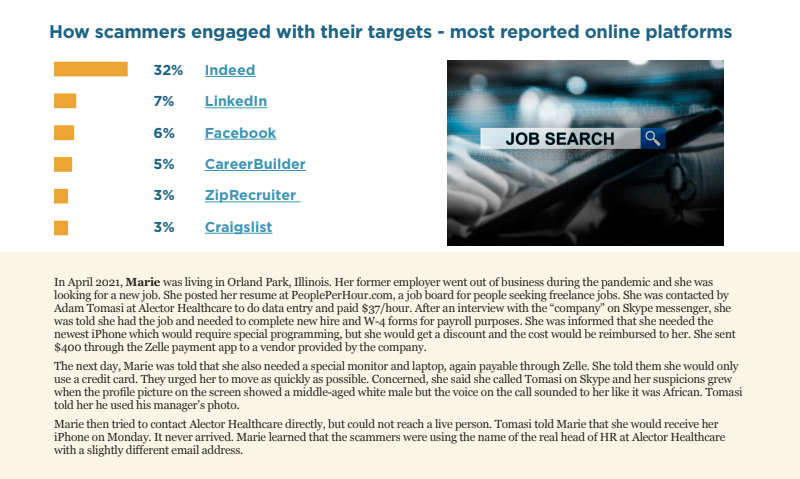
In today’s challenging job market, job scams are a big problem, costing Americans about $2 billion each year, as reported by the Better Business Bureau. These scams specifically target job seekers and fresh graduates who are eager to find work, tricking them into giving away their personal information and money. The pandemic made things worse, as scammers took advantage of the big layoffs that happened to employees and the increasing interest in remote work. In this article, we’ll help you recognize the most common job scams and show you how to spot them online, especially on social media.
How scammers approach their victims
Job scammers use various tactics to approach their victims, including [1]:
Fake Job Listings: Scammers create enticing job advertisements on online platforms, job boards, and social media sites like LinkedIn, Indeed, and Facebook, promising high-paying positions with minimal qualifications. These job postings often lack specific company details or contact information, making it difficult for victims to verify their legitimacy.

Impersonating Employers: Scammers impersonate genuine employers or HR representatives. They reach out to candidates directly on their DMs and claim to have seen their resumes online.
Work-From-Home Scams: With the rise in remote work interest, scammers exploit this trend by offering fake work-from-home opportunities that promise high income with little effort.
What to pay attention to as a job seeker
According to LinkedIn, several warning signs can help identify a typical scam message. Here are the following red flags to watch out for [2]:
- Feeling rushed: If a recruiter puts pressure on you to make quick decisions or demands immediate payment for a job opportunity, it’s likely a scam. Legitimate employers understand the importance of giving candidates sufficient time to consider their offers.
- Requests for personal information: Be cautious of messages or emails asking for personal information like Social Security Numbers, passport details, or date of birth. Legitimate employers typically request such information after making a formal job offer.
- Requests for financial information: Genuine employers do not ask job seekers for their financial information during the hiring process. If you are asked to provide bank account details, credit card numbers, or other financial data, it’s a strong indication of a scam.
- Unrealistic high salaries: Be cautious of job postings or messages promising exceptionally high salaries that seem too good to be true. Scammers often use tempting salary offers to lure in unsuspecting victims.
- Generic messages: Scammers often send messages without addressing recipients personally. If a message lacks personalization and seems like a copy-paste template, exercise caution.
- Poor spelling and grammar: Beware of messages or job postings containing numerous spelling or grammar mistakes. Legitimate employers maintain professional communication, so errors may signal fraudulent activity. However, this red flag may not be so effective now because scammers can use generative AI tools, like ChatGPT, to remove spelling and grammar mistakes.
How to avoid falling for job scams
Before accepting a job offer, try to follow these simple steps [3][4]:
- Research online: Look up the company’s name or the person hiring you along with words like “scam,” “review,” or “complaint.” Check if others have reported being scammed by them. While the absence of complaints doesn’t guarantee honesty, it can warn you about possible issues.
- Talk to someone you trust: Discuss the job offer with someone you trust. Get their opinion, and use this time to carefully consider the offer.
- Don’t pay for a job: Legitimate employers, including the government, never ask you to pay for a job. If someone demands payment, it’s a scam.
- Beware of fake checks: If an employer sends you a check to deposit and then asks you to send part of the money back or buy gift cards, be cautious. It’s a fake check scam, and you’ll be responsible for repaying the bank when the check bounces.
Remember to thoroughly research and verify the legitimacy of any job opportunity before sharing personal information or committing to any financial transactions.
About Eydle
The Eydle® Scam Protection Platform is here to keep you safe from financial scams online. Our advanced technology uses powerful visual analysis to detect scams and protect you from harm. It’s easy to use, with no complicated setups. Backed by a team of experts from MIT, Stanford, and Carnegie Mellon, as well as cybersecurity and AI leaders, Eydle ensures a robust defense against fraud.
You can trust Eydle to help you navigate the digital world with confidence. To learn more about our services and how Eydle safeguards you, visit our website at www.eydle.com or contact us at [email protected] today.
Sources:
[1] https://www.bbb.org/all/scamstudies/jobscams/jobscamsfullstudy
[2] https://www.linkedin.com/help/linkedin/answer/a1336387/recognize-and-report-scams?lang=en
[3] https://consumer.ftc.gov/articles/job-scams
[4] https://www.youtube.com/watch?v=TIFPKyIhhhI
Secure Your Job Search: Identifying and Avoiding Social Media Job Scams was originally published in Eydle on Medium, where people are continuing the conversation by highlighting and responding to this story.




